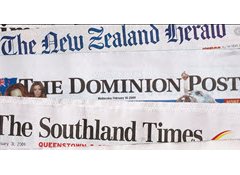Home : Research Results : Trust in news - but concern over poor journalism
Research Results
Trust in news - but concern over poor journalism
23 Apr 20

A majority of New Zealanders trust the news they are personally using.
However, they are strongly concerned over some aspects of poor journalism and 86% are concerned over the use of the term "fake news" to discredit news sources.
The Tuust in news survey was conducted by Horizon Research for the AUT research centre for Journalism, Media and Democracy (JMAD).
Key results:
Majority trust:
- Compared internationally, trust in news in Aotearoa New Zealand generally is high, with 53% of people agreeing they can trust ‘most of the news most of the time’.
- Even more New Zealanders (63%) trust the news they personally consume. • Trust in news consumed via social media and search engines in Aotearoa New Zealand is low when compared internationally.

- State broadcasters are the most trusted outlets for news in Aotearoa New Zealand, with Radio New Zealand (7) and Television New Zealand (6.8) topping the rankings as most trustworthy when ranked out of 10.

- Internationally, public broadcasters tend to have higher trust score than digital outlets as they have a longer track record.
Concerns over poor journalism:
- Despite strong levels of trust in news, New Zealanders are strongly concerned by poor journalism (factual mistakes, dumbed down stories, misleading headlines/clickbait), facts being spun to push certain agendas, and commercial and political messages dressed up as news.
- New Zealanders are more concerned about ‘fake news’ than news consumers in 38 other countries.68% of respondents were concerned about what was real or fake on the internet. This is higher that in the Reuters Institute’s Digital News Report 2019. In the Reuters sample, a little more than half of respondents – 55% – in 38 countries were concerned about their ability to separate fake and real news. The concern was at the same level in New Zealand as in Mexico and Spain (68%) and higher in countries such as the UK and Brazil.

- New Zealanders are worried about the use of term ‘fake news’, too; 86% of respondents were concerned it was used by politicians and others to discredit news sources they did not like, with 50% of respondents saying they were strongly concerned about this.
The data for this research was collected by Horizon Research. The results in the full report (download here) are drawn from a national online survey of New Zealand adults (18 years of age or over) who are members of Horizon's specialist research panel and a third-party research panel, which both represent the New Zealand population at the 2018 Census. Questions in the survey exactly matched those concerning public trust in the news in the annual digital news survey conducted in 2019 in 38 countries by the Reuters Institute for the Study of Journalism. In terms of limitations, as noted elsewhere, any influence the Covid-19 pandemic lockdown in Aotearoa New Zealand in 2020 may have had on survey results is difficult to judge.
Between March 23 and 30, 2020, 1204 people responded to the trust-in-news survey. This sample is weighted on age, highest educational qualification, personal income, employment status, ethnicity and region to match the New Zealand population at the 2018 Census. It has a maximum margin of error at a 95% confidence level of ±2.9% overall.
HorizonPoll Online Survey system
and website developed by BEWEB
Copyright © 2010. HorizonPoll incorporating ShapeNZ - Listening to New Zealand


